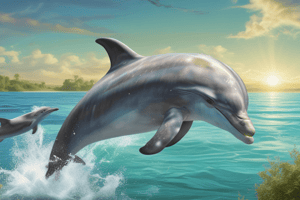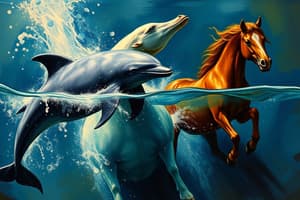Podcast
Questions and Answers
How fast can adult cheetahs run?
How fast can adult cheetahs run?
- 80 miles per hour
- 60 miles per hour
- 70 miles per hour (correct)
- 50 miles per hour
What is the primary purpose of the mantle on a cheetah cub?
What is the primary purpose of the mantle on a cheetah cub?
- To attract mates
- To help with camouflage (correct)
- To signal danger
- To provide warmth
At what age do cheetah cubs start hunting on their own?
At what age do cheetah cubs start hunting on their own?
- 15 months (correct)
- 8 months
- 24 months
- 12 months
What do cheetah cubs do to practice their hunting skills?
What do cheetah cubs do to practice their hunting skills?
Why does a mother cheetah move her cubs to different locations?
Why does a mother cheetah move her cubs to different locations?
How much does a cheetah cub weigh at birth?
How much does a cheetah cub weigh at birth?
Which habitat do wild horses prefer?
Which habitat do wild horses prefer?
What is a significant threat to cheetah populations?
What is a significant threat to cheetah populations?
What are dolphins primarily known for?
What are dolphins primarily known for?
What factor has contributed to the endangerment of the blue whale?
What factor has contributed to the endangerment of the blue whale?
Which of the following is a primary reason for the endangerment of lions?
Which of the following is a primary reason for the endangerment of lions?
Which of these animals is classified as herbivores?
Which of these animals is classified as herbivores?
What type of ecosystem is almost half of Africa covered by?
What type of ecosystem is almost half of Africa covered by?
What do dolphins require to thrive in their habitats?
What do dolphins require to thrive in their habitats?
What human activity has significantly impacted habitats and animal populations?
What human activity has significantly impacted habitats and animal populations?
What primarily threatens blue whales?
What primarily threatens blue whales?
What is a common reason for the endangerment of great white sharks?
What is a common reason for the endangerment of great white sharks?
At what age does a horse become an adult?
At what age does a horse become an adult?
What stage of the lion's life cycle occurs before they join the pride?
What stage of the lion's life cycle occurs before they join the pride?
Which stage is NOT part of a crocodile's life cycle?
Which stage is NOT part of a crocodile's life cycle?
What is a key factor in the rapid change of a monkey's life cycle compared to a human's?
What is a key factor in the rapid change of a monkey's life cycle compared to a human's?
What do young hens, or pullets, do before they can lay eggs?
What do young hens, or pullets, do before they can lay eggs?
What adaptation allows cheetahs to achieve high speeds?
What adaptation allows cheetahs to achieve high speeds?
For how long can cheetahs sustain their top speed?
For how long can cheetahs sustain their top speed?
What is a major trait that defines land mammals?
What is a major trait that defines land mammals?
Flashcards are hidden until you start studying
Study Notes
Dolphin Habitats and Behavior
- Dolphins inhabit warm ocean waters globally, with coastal dolphins closer to shore and larger offshore dolphins found in deep waters.
- They travel in pods for food and protection against predators, relying on access to clean water and food sources.
Horses and Their Environments
- Domesticated horses can adapt to various habitats, while wild horses prefer open areas like plains and prairies for safety and grazing.
- They require shelter and fresh water for survival, consuming large quantities of grass as herbivores.
Cheetah Characteristics
- Cheetahs are the fastest land mammals, with speeds reaching up to 60 miles per hour.
- Endangerment is due to habitat loss, prey scarcity, and threats from humans, hunters, and poachers.
African Savanna Ecosystem
- Savannas cover nearly half of Africa, situated between rainforests and deserts, characterized by diverse grass types.
- This habitat supports many herbivores (giraffes, zebras, elephants) and carnivores (lions, hyenas). Threats include habitat destruction and hunting.
Lion Population Threats
- Various lion species face extinction due to habitat destruction driven by human expansion and declining prey populations.
- Conservation efforts aim to boost lion numbers through protection initiatives.
Blue Whale Endangerment
- Blue whales are endangered mainly due to historical whaling practices, which continue to affect their population despite legal protections since 1966.
- Current threats include boat strikes, pollution, climate change, and noise from human activities.
Great White Shark Conservation
- Endangerment stems from human actions such as pollution, illegal fishing, and accidental bycatch.
- Conservation measures, including protected status and bans on shark fin soup, help in increasing their population.
Snake Habitat Diversity
- Snakes are widespread, thriving in warm climates and various habitats such as forests, deserts, and aquatic environments.
- They regulate their body temperature by moving within their habitats, utilizing cool or warm areas as needed.
Horse Life Cycle Stages
- Horses undergo distinct life stages: foal (baby horse), yearling (one year old), colt (male), filly (female at two), and adult by four years.
- The average lifespan of a horse is approximately 25 years.
Lion Cub Development
- Lion cubs mature rapidly, developing from birth to adulthood (fully grown) in under six years, beginning their journey with maternal protection and care.
Tiger Life Cycle
- Tiger life cycles consist of several stages, starting as blind cubs requiring maternal care, learning to hunt as they grow, and becoming independent by 17 months to two years.
Crocodile Life Cycle
- Crocodiles have three life stages: nesting (before birth), young, and adult, marking the cycle from egg hatching to maturity.
Monkey Life Cycle Overview
- A monkey's life cycle starts in the womb (gestation), followed by childhood and adulthood, with a lifespan ranging from 10 to 50 years depending on species.
Chicken Development
- Hens, called pullets until they lay eggs, hatch covered in down and can begin laying eggs shortly after mating, living between 2 to 25 years or more.
Cheetah Speed Adaptations
- Cheetahs achieve high speeds due to anatomical adaptations—wide nostrils, large lungs, and muscular build—that facilitate oxygen delivery to muscles.
Cheetah Running Limitations
- Although capable of reaching speeds up to 70 miles per hour, cheetahs can only sustain such bursts for around 30 seconds due to energy constraints.
Cheetah Cub Survival
- Cheetah cubs, weighing just 5 to 10 ounces at birth, rely on their mother for protection, learning vital survival skills through play and practice during their early months.
Cheetah Parenting and Learning
- Cubs drink their mother's milk for 6–8 weeks, then engage in play that mimics hunting behaviors, evolving into successful hunters by around 15–24 months when they disperse from their mother.
Studying That Suits You
Use AI to generate personalized quizzes and flashcards to suit your learning preferences.




